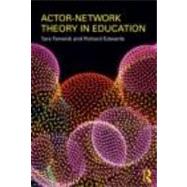- ISBN: 9780415492980 | 041549298X
- Cover: Nonspecific Binding
- Copyright: 7/9/2010
In the last decade actor-network theory (ANT) has become increasingly influential in sociologies of technology and the social sciences more generally. It has grown, in part, out of and as a response to poststructuralism. Since its first introduction, actor-network theory has undergone significant shifts and evolutions and as a result, it is not considered to be a single or coherent theoretical domain, but as developing diversely in response to various challenges. ANT explores how the social ' people, objects, practices and ideas - comes to be organized in particular ways.Actor-network theories particularly provide important conceptual resources for understanding and researching lifelong learning and education. Its particular focus on materiality and inter-objectivity is useful for expanding conceptions of intersubjectivity, narrative, meaning-making and discursive practice that still tend to dominate current educational research. In essence actor-network theories can illuminate different approaches to studying processes of curriculum implementation, educational policy, knowledge generation, knowledge mobilization, and educational issues of accountability and standards ' as well as the puzzles that arise from educational interventions that both work and don't work at the same time.This book presents an overview of actor-network theory, with detailed discussion focusing on those particular elements that can assist research in lifelong learning and wider aspects of education. While successive chapters illustrate the deployment of actor-network theories in a range of contexts ' both geographical and organizational. With examples from the US, Canada, the UK, and Australia individual cases include technology-mediated instruction (in university and primary school), literacy, innovation in workplaces, professional standards of teaching, and educational policyscapes. Across these diverse contexts the authors trace how learning and practice ' as assemblages of activity, actors and spaces ' emerge, show what scales are at play, and demonstrate what this means for educational possibilities.







